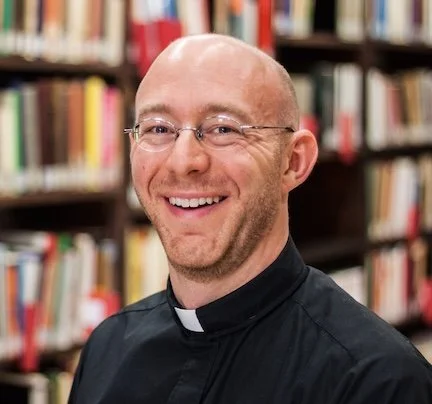Fr. Anthony Lusvardi
Father Anthony R. Lusvardi, S.J., is an American Jesuit priest and sacramental theologian teaching at the Pontifical Gregorian University in Rome. A native of Minnesota, he holds a B.A. in English and Philosophy from the University of Notre Dame, an M.A. in Applied Philosophy from Loyola University Chicago, an M.T.S. from Boston College, and both an S.T.L. and S.T.D. in Dogmatic‑Sacramental Theology from the Pontifical Atheneum of Saint Anselm. Before his current role in Rome, he served in pastoral ministry on the Rosebud Reservation in South Dakota, where his experiences inspired his theological focus on baptism and evangelization.
He is author of Baptism of Desire and Christian Salvation, a work defending the necessity of sacramental baptism in the Church’s teaching and presenting a compelling argument for the validity of baptism of desire for infants of parents who desire their baptism but die before they can receive the sacrament.
Find more about Fr. Tony and his work at: https://tonylusvardisj.com
Fr. Tony was recently interviewed on Real Presence Radio about Baptism of Desire for infants and Baby Brian.
Grounded Hope in Baptism of Desire
After a decade of studying Baptism of Desire, Father Anthony Lusvardi offers a fresh theological look at what happens to babies who die before baptism, grounding his argument in Scripture, tradition, and the Church’s sacramental practice. Readers are invited to see how the doctrine of Baptism of Desire—understood through lex orandi, lex credendi—can reveal new hope and confidence that baptism of desire can be apply to babies, too.
Quotes from
Baptism of Desire and Christian Salvation
by Anthony R. Lusvardi, SJ
“The question of how infants can, in any meaningful way, desire baptism still needs to be answered. But the lex orandi suggests that we should look harder for an answer…we should look for a solution in the rite itself, where the consent of the child is supplied by parents and godparents. Again, I believe that the lex orandi suggests that the burden of proof should fall on those who argue that this consent is insufficient for baptism of desire because it is sufficient of the sacrament. In fact [there is an] ancient assertion of the belief that the intention of Christian parents to baptize a child who died unexpectedly is sufficient for salvation—the fifth century epitaph of the little Theudosius found in Southern Gaul. “ pg 356
The epitaph on the fifth-century gravestone of “Little Theudosius” reads:
Worthy child, circled round by the rampart of the cross, innocent, undarkened by the filth of sin, little Theudosius, whose parents in purity of mind intended to bury him in the holy baptismal font, was snatched away by shameless death; yet the ruler of high Olympus will give rest to any member lying beneath the noble sign of the cross, and the child will be heir to Christ.
Fr. Lusvardi explains, “Theudosius’s parents seem to have been aware of the necessity of baptism for salvation because, although his innocence is stipulated, they feel the need to mention their intention to immerse him in the font. They emphasize the purity o f their intention and that they were prevented from realizing it by circumstances beyond their control—Theudosius was seized by death. We probably should not read much into their mention of ‘Olympus’ beyond a poetic reference to God; it is clear that they see the cross as the sign of salvation and expect the child to be called to eternal life by Christ.” pg 103
“I hold, therefore, that we have strong grounds to believe that, if parents intend to baptize their child but that child dies before they are able to do so, then that child will be saved through baptism of desire. This includes children dying in utero. Parents need not express their intentions verbally, but it is implicit in their own practice of the Christian faith.” (pg 358)
“In the hardest of hard cases, children dying before baptism, the doctrine provides grounds for a confident response to Christian parents who have lost a child.” (pg 360)

